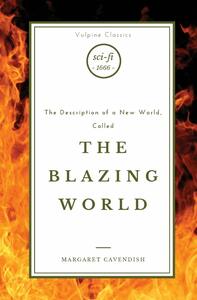Take a photo of a barcode or cover
I’ve noticed most of the more negative reviews regard this book as boring... it’s from the 17th century and, especially part 1 of The Blazing World, is more so a series of questions asked to various experts of this new world.
I really enjoyed this and continue to reflect on little details while I fold laundry. My girlfriend also read this and really loved the world building. I found I enjoyed the “The Blazing World” as a sort of door to our own world- reminding me to ask more questions, especially regarding the natural world. (I ended up reading a lot about moths after one of the Empress’s questions about the presence of blood as a requirement for creatures to be considered living organisms).
The Blazing World is the longest of the stories (about 100 pages) but the other stories are still enjoyable.
As an Aside:
“The Contract” was a fun and quick read compared to “The Blazing World.” Though Cavendish obviously came first, “The Contract” reminded me of a short story by F. Scott Fitzgerald called “The Camel’s Back”, which I found to be pretty hilarious.
I really enjoyed this and continue to reflect on little details while I fold laundry. My girlfriend also read this and really loved the world building. I found I enjoyed the “The Blazing World” as a sort of door to our own world- reminding me to ask more questions, especially regarding the natural world. (I ended up reading a lot about moths after one of the Empress’s questions about the presence of blood as a requirement for creatures to be considered living organisms).
The Blazing World is the longest of the stories (about 100 pages) but the other stories are still enjoyable.
As an Aside:
“The Contract” was a fun and quick read compared to “The Blazing World.” Though Cavendish obviously came first, “The Contract” reminded me of a short story by F. Scott Fitzgerald called “The Camel’s Back”, which I found to be pretty hilarious.
I love the way Cavendish crafts her worlds, even if she is sometimes a bit too philosophical for me. “And in the formation of those worlds, I take more delight and glory, than ever Alexander or Caesar did” pretty much sums it up and inspires me to write.
I can't really properly review this without stripping it away and touching on it's smaller parts which would be a great disservice to Margaret Cavendish who created such an amazing world in this Blazing World. She sought to fix the problems with her own world as "The Lady" later deemed "The Empress" learns from her many subjects the workings on their world, some drawn from our own.
The Blazing World is inhabited by fishman and other fish-like men (sirens) with satyrs and giants along with a bevy of other creatures which looked like themselves but walked upright like men (fox-men, bear-men, bird-men). There are ships of gold and ships of leather, each with two seemingly wind powered engines that propelled them forward (one which went against the waves). It's stuff like this and the extravagant cities filled with gold and diamonds and garnets that make this story unique.
I can see other parts where people might feel that Margaret Cavendish made The Empress a bit of a Mary Sue with a literal self insert character, but it was all about self reflection and more a witty take on her own life and the life of her friend The Empress. In something that is written in such a conversational manner, you being told a recount of the story instead of reading the events yourself, you can still relate and admire the characters which I found was fairly surprising and interesting.
I mainly picked this up from a meme that said Mary Shelley was the mother of science fiction, but everyone touted Margaret Cavendish's The Blazing World as the true source. I didn't think I would enjoy it as much, but I did. I will say you should listen to the audiobook instead of reading it. I found a great copy on LibriVox thanks to my friend.
The Blazing World is inhabited by fishman and other fish-like men (sirens) with satyrs and giants along with a bevy of other creatures which looked like themselves but walked upright like men (fox-men, bear-men, bird-men). There are ships of gold and ships of leather, each with two seemingly wind powered engines that propelled them forward (one which went against the waves). It's stuff like this and the extravagant cities filled with gold and diamonds and garnets that make this story unique.
I can see other parts where people might feel that Margaret Cavendish made The Empress a bit of a Mary Sue with a literal self insert character, but it was all about self reflection and more a witty take on her own life and the life of her friend The Empress. In something that is written in such a conversational manner, you being told a recount of the story instead of reading the events yourself, you can still relate and admire the characters which I found was fairly surprising and interesting.
I mainly picked this up from a meme that said Mary Shelley was the mother of science fiction, but everyone touted Margaret Cavendish's The Blazing World as the true source. I didn't think I would enjoy it as much, but I did. I will say you should listen to the audiobook instead of reading it. I found a great copy on LibriVox thanks to my friend.
1.5 stars. Oof. This one was a chore. Forget the description on the jacket blurb. This isn’t really a work of sci-fi, or a Utopian novella, or even a feminist text. Those are all just modern lenses through which to view what is a fictional political, scientific, and philosophical polemic steeped in 17th-century inside jokes. Cavendish’s life seems far more interesting than this book, for which I had such high expectations after reading the description -- the literary equivalent of an exciting trailer for a dull movie.
The rating here is a very conflicted four, because this is a very well written book of-its-time, but it has not aged well. In particular the ‰Ычdifferent races do different things well‰ЫЄ is heavy handed, and the section on ‰ЫчJewish Cabbala‰ЫЄ was just, urgh.
This is utopian fiction, but rather than being about a utopia for all, it seems to be about utopia for one. By which the person gets abducted, and then becomes the uncontested leader of a new world. Where there are jewels beyond compare, and people to do their bidding.
Overall, fascinating in a ‰Ычreading historical texts‰ЫЄ way, but I don‰ЫЄt recommend it as pleasure reading.
This is utopian fiction, but rather than being about a utopia for all, it seems to be about utopia for one. By which the person gets abducted, and then becomes the uncontested leader of a new world. Where there are jewels beyond compare, and people to do their bidding.
Overall, fascinating in a ‰Ычreading historical texts‰ЫЄ way, but I don‰ЫЄt recommend it as pleasure reading.
Well, it's short. And from a distance it's an interesting text - a forerunner of modern science fiction, a utopia devised by a 17th century woman, and there are odd parts of it that are genuinely entertaining. (The magpie, parrot, and jackdaw men trying to prove via syllogism that politicians are or aren't "knaves" and the totally disgusted reaction of the Empress to their logical tangle made me laugh out loud.) Most of it, however, is pedantic in the extreme and a bit of a bore, and the magpie-like tendencies of the author are on full display, going on and on and bloody on about jewels. Look, I get it, they're shiny and you love them, but move on already! Less jewels and more paragraphs would have improved this immeasurably, but probably not enough to bump it up to three stars if I'm honest.
I've read it. I can honestly say that I've read it. I doubt I'll be reading it again.
I've read it. I can honestly say that I've read it. I doubt I'll be reading it again.
adventurous
challenging
slow-paced
Plot or Character Driven:
A mix
Strong character development:
No
Loveable characters:
Complicated
Diverse cast of characters:
Complicated
Flaws of characters a main focus:
No
inspiring
reflective
relaxing
fast-paced
Plot or Character Driven:
Character
Strong character development:
Complicated
Loveable characters:
Yes
Diverse cast of characters:
Complicated
Flaws of characters a main focus:
Complicated
I hardly know how to rate this, it is certainly not an enjoyable read, very boring in parts, and not written very well, but then, it's remarkable in its way, the work of an obviously remarkable woman of the 1660s.




